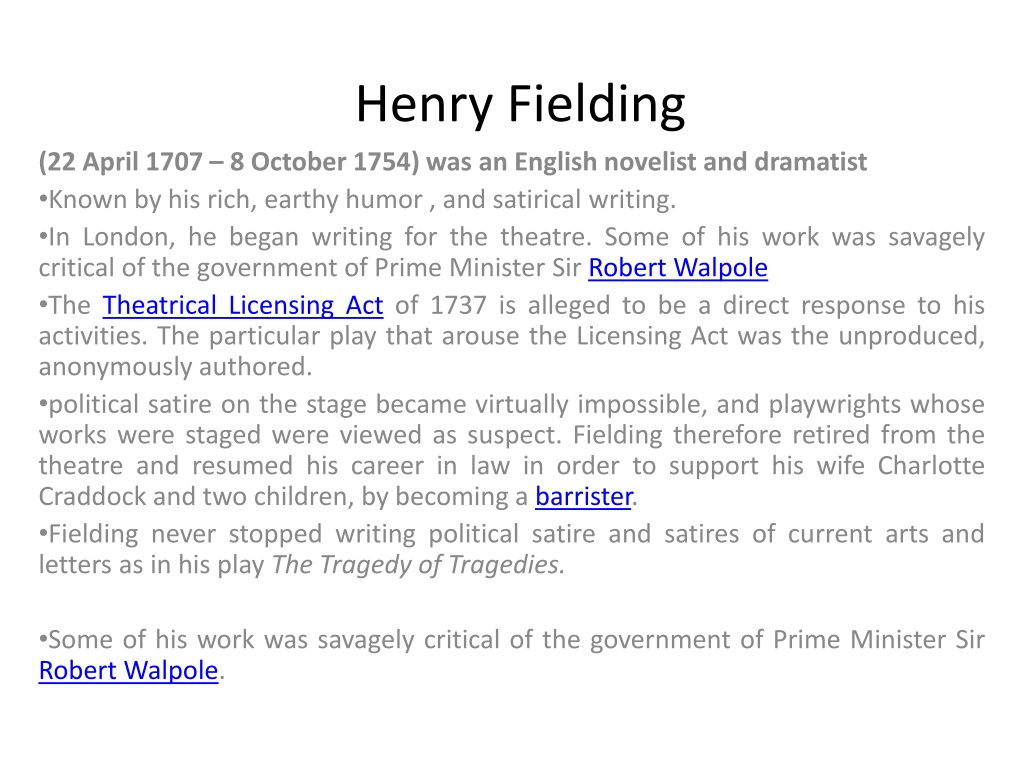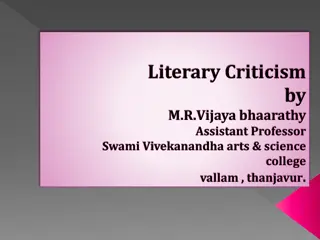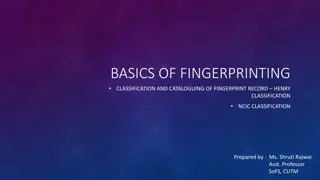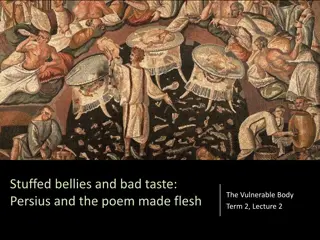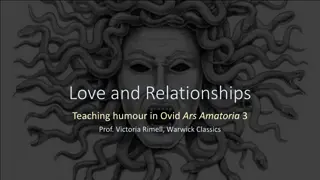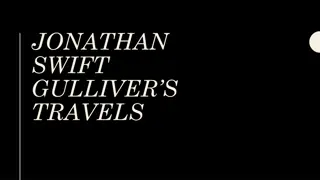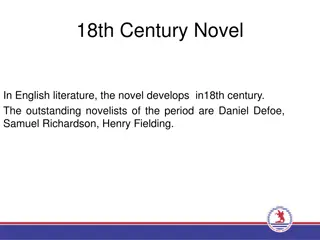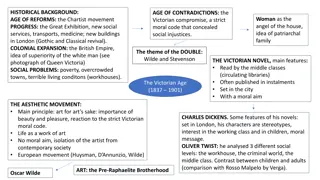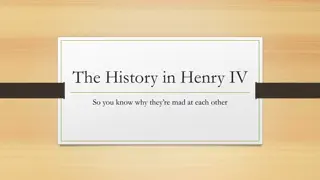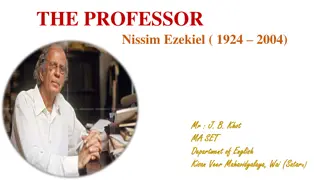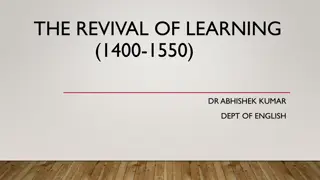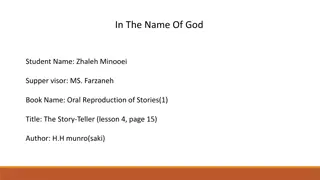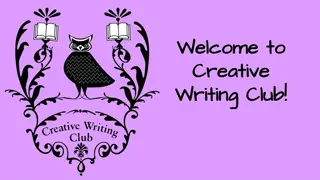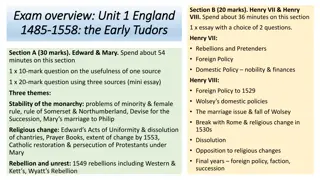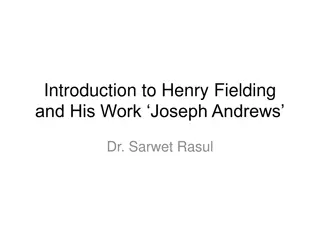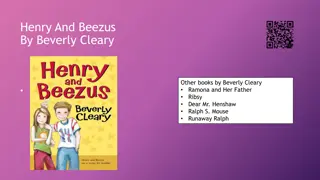The Satirical Legacy of Henry Fielding: A Literary and Social Critique
English novelist and dramatist Henry Fielding is known for his rich humor and satirical writing, which often criticized the government of Prime Minister Sir Robert Walpole. Fielding's works reflected his anti-Jacobite views and support for the Church of England. He delved into writing novels as a form of social commentary, blending classical traditions to create unique and reflective narratives. Fielding also advocated for judicial reform and improvement of prison conditions, emphasizing social justice and divine providence in his writings.
Download Presentation

Please find below an Image/Link to download the presentation.
The content on the website is provided AS IS for your information and personal use only. It may not be sold, licensed, or shared on other websites without obtaining consent from the author. Download presentation by click this link. If you encounter any issues during the download, it is possible that the publisher has removed the file from their server.
E N D
Presentation Transcript
Henry Fielding (22 April 1707 8 October 1754) was an English novelist and dramatist Known by his rich, earthy humor , and satirical writing. In London, he began writing for the theatre. Some of his work was savagely critical of the government of Prime Minister Sir Robert Walpole The Theatrical Licensing Act of 1737 is alleged to be a direct response to his activities. The particular play that arouse the Licensing Act was the unproduced, anonymously authored. political satire on the stage became virtually impossible, and playwrights whose works were staged were viewed as suspect. Fielding therefore retired from the theatre and resumed his career in law in order to support his wife Charlotte Craddock and two children, by becoming a barrister. Fielding never stopped writing political satire and satires of current arts and letters as in his play The Tragedy of Tragedies. Some of his work was savagely critical of the government of Prime Minister Sir Robert Walpole.
Henry Fielding The parody of Fielding was turned into an accomplished novel of much serious manner of a debut novelist. In 1743, he published a novel in the The History of the Life of the Late Mr Jonathan Wild the Great, which is sometimes counted as his first, as he almost certainly began it before he wrote Shamela and Joseph Andrews. It is a satire of Walpole that draws a parallel between him and Jonathan Wild, the infamous gang leader and highwayman. He implicitly compares the Whig party in Parliament with a gang of thieves being run by Walpole, whose constant desire to be a "Great Man . Fielding's consistent anti-Jacobitism and support for the Church of England led to his being rewarded a year later with the position of London's chief magistrate. Most of his work was concerned with London's criminal population of thieves, informers, gamblers, and prostitutes. In a corrupt and callous society he became noted for his impartial judgements, incorruptibility, and compassion for those whom social inequities had forced into crime.
Henry Fielding He wrote for Tory periodicals, usually under the name "Captain Hercules Vinegar". Fielding continued to air his liberal and anti-Jacobite views in satirical articles and newspapers in the late 1730s and early 1740s. Almost by accident he took to writing novels in 1741, angered by Samuel Richardson's success with Pamela. Shamela is considered the first successful anonymous parody that followed other satirical models of Jonathan Swift and John Gay . Fielding based his later works on writing parody as in Joseph Andrews, who supposed to be Pamel a brother. His purpose was beyond a mere satire, yet something to be remembered and unique in English language. In this new kind of writing, which Fielding called a "comic epic poem in prose," he creatively blended two classical traditions: that of the epic, which had been poetic, and that of the drama, but emphasizing the comic rather than the tragic. Fielding stresses on the fact that his writings is directed to reflect the reality of the characters and the everyday life away from the fables of the past.
Henry Fielding He did much to enhance judicial reform and improve prison conditions. Fielding's influential pamphlets and enquiries included a proposal for the abolition of public hangings. He stresses on God s divinity and the social justice that can be faded away from a strong belief in Christianity. Moreover, he rejected the closing horizon of materialism that causes poverty. That was clear in his treatise Examples of the Interposition of Providence in the Detection and Punishment of Murder. His mother's father was a justice of the Queen's Bench, while his paternal grandfather was an archdeacon of Salisbury; in these two men there may have been something of the genesis of Fielding's bent toward the law, his great love of learning, and his firm sense of Christian morality. In 1737 the harassed Prime Minister, Sir Robert Walpole, introduced a Theatrical Licensing Act. Fielding wrote no more for the stage, but his novels are richer because of his experience as a playwright
An Apology for the Life of Mrs. Shamela Andrews It is a satir,ical burlesque novella, written in 1741 as a response to Richardson s Pamela. Fielding never admitted to writing the work for he used to write by a pseudonym. The novel is a parody of, and direct response to, the stylistic failings and moral hypocrisy that Fielding saw in Richardson's Pamela. By poking fun at every aspect of Richardson's method and message, Fielding exposes the hypocrisy of contemporary mores (habits). The work is more than a simple parody of Richardson, however, as Fielding lampoons (satirize) political figures, the clergy, and contemporary writers. Shamela also marked a turning point in the modern novel, as it prepared the way for Fielding's more complex and ambitious work, Joseph Andrews (1742), which launched (started) the tradition of comic fiction in English literature.
Shamela: critical point of view Fielding started translation work and in 1739 launched a newspaper, the Champion, for which he wrote a number of essays that satirized politics, law, literature, religion, and government. As he inveighed against all manner of societal excesses and corruption in the Champion, Fielding was in fact preparing himself for the pointed satire that was to come in Shamela. In 1740. Richardson claims that Pamela is a model of virtue, whose chastity is rewarded, but Fielding in his novel equates morality with expediency, as Shamela behaves as she does in order to secure material comforts for herself. Throughout the novel Shamela uses words such as feign, act, and pretend. She tempts Booby but pretends to do so unwittingly, thus retaining her virtuous image, resisting him in order to appear virtuous and lure him into marriage and elevate herself socially. Shamela is not the virtuous woman Richardson supposes but rather a calculating, conniving creature.
Shamela: critical point of view While Fielding parodies Richardson's views on morality and virtue, at the same time he presents his own moral message about hypocrisy and feigned goodness. His criticism of hypocrisy extends also to the clergy (represented by Parson Williams), the gentry (in Squire Booby), and the political establishment. The theme of faith versus good works is also explored in the character of the parson. Fielding with his novel attacks corruption on many levels, from the perversion ( deviation) vartue of language to the exploitation of the nature of decency and uprightness for political purposes. Analyses have explored issues such as the nature of Fielding's parody; the work's complex, multi-layered satire of contemporary values and politics; the similarities and differences between Shamela and Pamela; the anticipation in the novel of themes elaborated upon in Joseph Andrews; the satire's concern with sexuality, gender, literacy, and class; the idea of authenticity; and Fielding's political attitudes.
Joseph Andrews Published in 1742 and defined by Fielding as a "comic epic poem in prose. The novel represents the coming step of the two competing aesthetics of 18th-century literature: the mock-heroic and neoclassical approach. The novel depends much on Jonathan Swift s Gulliver's Travels (1726) that the latter is considered the most famous work of Swift as foremost prose satirist in the English language. Andrews relies on bawdy (immoral) humor, an impending ( close to happen)marriage and a mystery surrounding unknown parentage, but conversely is rich in philosophical digressions, classical erudition and social purpose. Joseph Andrews is Fielding's objection to the moral and technical limitations of the popular literature of his day.
Joseph Andrews: Themes Learning/ Education The richness of the world/ chances in life Religion: sins, God, forgiveness, disbelieving in ghosts. The emphasizing on drama inside telling a story. The scenes of a play on a stage/ elements of drama. Life lessons, for example: gambling and the consequences of it like bankruptcy and going to prison. It prepared for the gothic writing, scenes of cemetery, Skelton, graves, and gothic rooms that contradicts the religious elements as the pray before mealing a dinner in a gothic room. Involving a story within a story or sub-stories of stealing an infant. Referring to poverty as social evil and problem that produces robbery and highwaymen. It presents a fear from violence and abuse of power by nobles.
Joseph Andrews: paradoxical concepts The opposite turning role of filtration by woman to man. A woman seduces man. The virtue of footman and the savagery of a noble. The rape of Joseph by a woman. The duel between a footman and a noble that was shaped by a comical scene. The nobility of the lower class.
The History of Tom Jones, a Foundling Tom Jones, is a comic novel. The novel is both a Bildungsroman and a picaresque novel. First published on 28 February 1749 in London Bildung, meaning "education," and Roman, meaning "novel"; English: novel of formation, education, culture. It is a literary genre that focuses on the psychological and moral growth of the protagonist from youth to adulthood in which character change is extremely important. The novel deals with the concept of a Capital Crime, the scene of a robber who was forgiven for the sake of his children. The novel is presented due to the comic scenes. For example, discovering the real bastard father of Moll s coming baby hidden in Moll s room while Tom tried to show his remorse to Molly. The novel contains so many proverbs that can be used as guidance keys to moral behavior such as: (wench is bearing a bastard), (once broken, never mended), (the wicked are snared in the work of their own hands).
Tom Jones: themes Law of nature: freeing the bird out of the cage and getting it back which is completely against the law of nature. Robbery: penalty , hanging, all are the government corruptions. Guilt vs mercy Compassion is one thing , but justice is another Education. Example: tutor, talking French, playing piano. The evil side of the society such as the slut character of Molly, the robbers, foundling, adultery, whores, nasty, and bastard. The contradictory scenes that mingled the law class and the aristocratic, the rich and the poor, as they usually never together in one place playing and enjoying their time. The severity of the aristocratic class in the scene of chasing and hunting a deer. Criticizing the rude country .
Tom Jones: themes Enhancing the value of marriage by Fielding when he names it as a noble institution. Moral lessons: ignorance that produces disobedience, and woman can t be convinced by force but by reason. The disorder of the British soldiers when they marched behind their commander singing Rule Britannia. It is Fielding s scene to make a satiric criticism. The parody of seducing Tom by many women whom he accepted and involved in many sexual affairs while he still seeks Sophia s forgiveness and love. Searching for material security. While Richardson s Pamela was to cultivate the principles of virtue and religion in the minds of youth of both sexes, Fielding proved the falsity of these principles in a hypocrite society and the corruption of a government .
